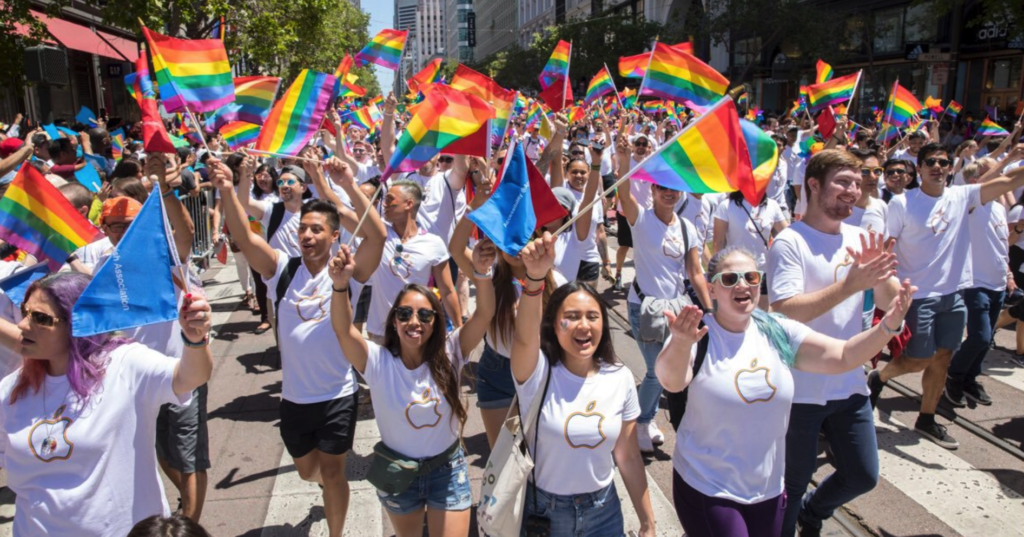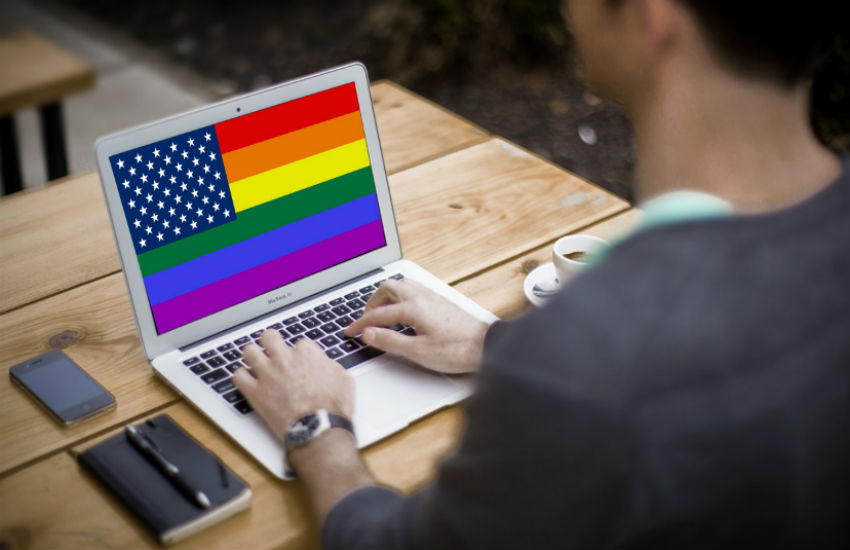LGBTI jobs and insurance: Harder to obtain than for heterosexuals, study finds.
LGBTI people in the US are less likely to have a job or access to health insurance than their heterosexual peers.
They’re also more likely to have poorer health and a lower quality of life, according to the results published in online journal BMJ Open.
‘Previous research has shown that nearly half of all sexual minorities experience employment discrimination in their lifetime,’ said lead author Brittany Charlton, an assistant professor at Harvard University’s T.H. Chan School of Public Health in Boston. ‘[This] can lead to disparities in health insurance coverage, and ultimately to health-related quality of life’.

An Apple a day: Some US firms, like Apple, are proud to support LGBTI staff. Photo: @Tim_Cook Twitter
Sexual inequalities in healthcare system for LGBTI people
‘Our findings highlight the ubiquity of sexual orientation inequalities in the employment and healthcare systems.’
Earlier research compared cohabiting straight and same-sex couples. This found that LGBTIs were more likely to be out of work and uninsured than their straight counterparts. Charlton and her colleagues wanted to see if those findings held up in a broader sample, Reuters reported.
So researchers analyzed responses from nearly 10,000 participants aged 18-32 years taking part in an ongoing study that began in 1996. Some were only nine years old when the study started.
Researchers collected information about sexual identity and orientation in annual surveys. They also collected information on health-related quality of life. Participants rated their mobility, self-care, capacity for routine activities, levels of pain and discomfort and anxiety and depression.
In a 2013 follow-up survey, Charlton’s team found that LGBTIs were about twice as likely to have been unemployed and uninsured over the prior year then their straight peers. They were also more likely to report poorer health and quality of life.
Overall, 7.5% were unemployed or not working due to illness or disability, while 5% were uninsured. A significant 38% lacked access to a routine physical health exam.
Bisexual women more nearly four times as likely to be uninsured

Bisexual women four times less likely to have insurance, study finds.
But for bisexual women, the odds of being uninsured were nearly four times those of straight counterparts, the study found. Gay men were 50% more likely to be unemployed due to illness or disability and gay women were 84% more likely.
Charlton suspects the situation could be even worse than her data show.
‘Most of the study participants were white and their families had middle-to-high household incomes,’ Reuters reported her as saying.
‘It is striking that these sexual orientation disparities are pervasive among participants who predominantly hold high social status. Given that, we may have underestimated levels of unemployment, being uninsured, and having poor health-related quality of life.’
Charlton believes the solution lies in new legislation, Reuters reported.
‘Until all people, regardless of sexual orientation, are treated equally in the eyes of the law…sexual orientation-related disparities will persist,’ she said.
The new research highlights the disparities faced by the LGBTI community, said William Padula, an assistant professor at the Johns Hopkins Bloomberg School of Public Health in Baltimore, Maryland.
Long term consequences of lack of investment
‘[B]y not investing in people’s primary up-front health care needs, we end up paying more for the long-term consequences,’ Reuters quoted him as saying.
Another issue, Padula said, is that healthcare plans often don’t offer the kinds of care needed specifically by LGBT patients.
‘Most employer-based healthcare plans are cookie cutter plans, meaning they are the same for everybody,” he said. “People in the LGBT community may need a little more, especially those who are transgender.’
In the end, investments in healthcare can pay off with greater productivity, Padula said.
‘Healthcare needs can be very distracting,’ he noted. ‘For example, if you’re a transgender person worried about how you’re going to pay for hormone replacement therapy, or for surgery, or for mental health needs, it can be very distracting. If an employer invested an extra $1,000 in that person’s premium, they might get $10,000 in increased productivity.’
See also:
Almost half of LGBTQ employees in the US are not out at work







